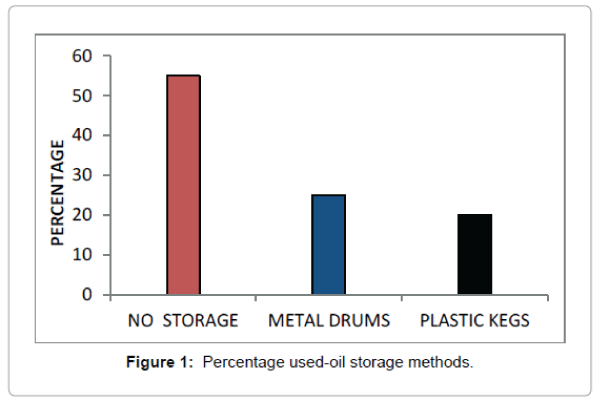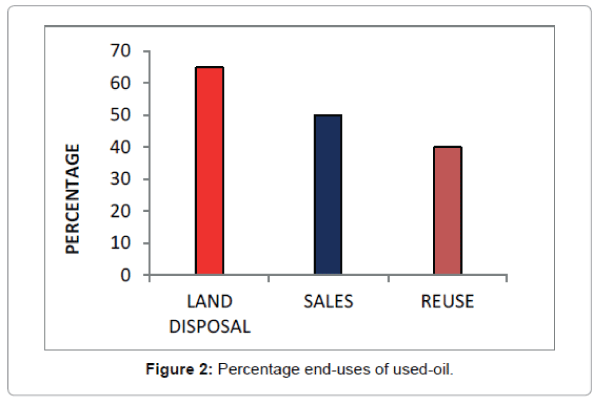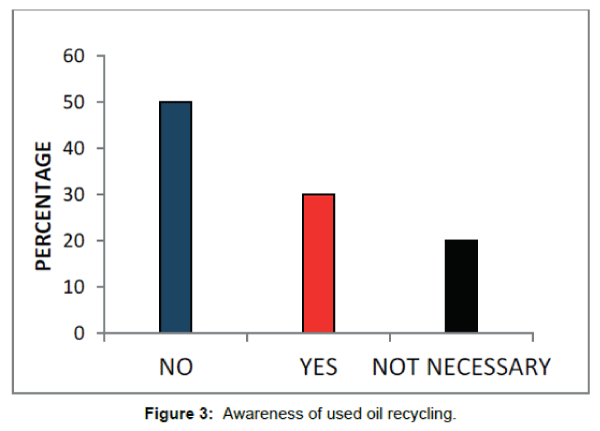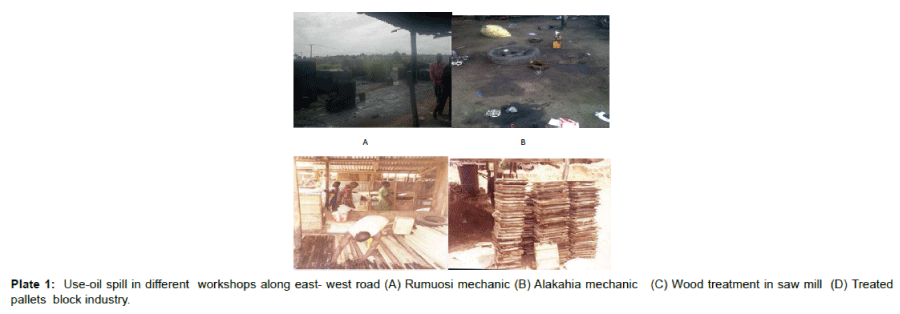Indexed In
- Open J Gate
- The Global Impact Factor (GIF)
- Open Archive Initiative
- VieSearch
- International Society of Universal Research in Sciences
- China National Knowledge Infrastructure (CNKI)
- CiteFactor
- Scimago
- Ulrich's Periodicals Directory
- Electronic Journals Library
- RefSeek
- Directory of Research Journal Indexing (DRJI)
- Hamdard University
- EBSCO A-Z
- Publons
- Google Scholar
Useful Links
Share This Page
Journal Flyer

Open Access Journals
- Agri and Aquaculture
- Biochemistry
- Bioinformatics & Systems Biology
- Business & Management
- Chemistry
- Clinical Sciences
- Engineering
- Food & Nutrition
- General Science
- Genetics & Molecular Biology
- Immunology & Microbiology
- Medical Sciences
- Neuroscience & Psychology
- Nursing & Health Care
- Pharmaceutical Sciences
Research Article - (2016) Volume 6, Issue 1
Used-Oil Generation and Its Disposal along East-West Road, Port Harcourt Nigeria
Abstract
Environmental Pollution from anthropogenic activities has contributed greatly towards the loss of biodiversity, and some organisms are at the verge of extinction and total extermination. Used oil as one of the wastes from automobile engines have contribute immensely towards the degradation of the environment and the problem of this has been traced to the poor handling of used oil and the ignorance of the major disposers of this used-oil. Out of 20 automobile mechanics interviewed in this study, 60% admitted that they dispose of used-oil on the land, 30% said that they sell it and only 10% acknowledge that they reuse it. On the issue of awareness about recycling, 50% admitted that they are aware, 30% claimed ignorance while 20% do not see the need for recycling. While considering storage method, 55% said that they do not store used oil, 25% store it in a metal drum, and 20% store in plastic drum. The mechanics estimated that about 418 cars are serviced weekly and a total of 1628.50 litres of used-oil are produced. For this result it is worth knowing that indiscriminate disposal of used oil as is commonly observed in our society can be of great environmental concern.
Keywords: Used-oil; Mechanics; Recycling; Storage; Reuse
Introduction
Oil (a synthetic lubricant used in automobile engines, generators and other machines) is one of the very dangerous sources of pollution. Once motor oil is drained from an engine, it is no longer clean because it has picked up materials, dirt particles, and other chemicals during engine operation. This lubricating oil is now classified as used-oil. According to the United State Environmental Protection Agency, Used -oil is defined as any oil that has been refined from crude oil or any synthetic oil that has been used and as a result of such use, is contaminated by physical or chemical impurities [1].
Ministry of Environment and Forest also defined used -oil as oil derived from crude oil or Mixtures containing synthetic oil including used engine oil, gear oil, hydraulic oil, turbine oil, compressor oil, industrial gear oil, heat transfer oil, transformer oil, spent oil and their tank bottom sludge which are suitable for re-refining [2].
Used motor oil is also found to contain a number of additional components from engine wears, this includes iron, steel, copper, lead, zinc, barium, cadmium, sulfur, water, and ash. Because of the contaminants it contains, used motor oil disposal can be more environmentally damaging than crude oil pollution [1]. These contaminants may cause both short-term and long-term effects if they are allowed to enter the environment [1].
Just one gallon of used -oil can make one million gallons of fresh water unfit for human consumption [3]. It takes only 50 to 100ppm of oil to foul the sewage treatment process if it is disposed of in a sewer drain [3]. Studies have shown that generally, five litres of oil can cover a small lake [1]. Causing: BOD depletion through the oil film formed on the water surface, dead of plants and animals that come in contact with it through its toxic effects, and also contamination of drinking water sources.
Hazards from used-oil contaminated water range from mild symptoms of toxic compounds in the liver of organisms to complete impairment of body functions and eventually death of the organism [4].
Safe collection and subsequent handling of used-oil is necessary to ensure environmental safety. Unfortunately, Nigeria lacks proper used-oil disposal methods , unlike other developed countries [5].
In most developed countries, used- oil are recovered and recycled. Some uses of used-oil include: Direct use as fuel, Re-refining of usedoils to fuel oil and Regeneration of used-oils to base oil [6].
The Federal Road Safety Commission (FRSC) in 2006 reported that Nigeria had an estimate of seven million vehicles on its roads, including trucks, buses, and motorcycles [7]. This data gives an insight into the number of automobiles using oil in their engines, gears, transmissions and hydraulic systems. Consequently, petrol stations and mechanic workshops generate used-oil, amounts and types vary with the kind, age and size of the vehicles. New passenger cars produce a few litres (4 to 6 litres) of drained motor oil (crankcase oil) due to infrequent servicing; old cars, of which there are many in Nigeria, are serviced more frequently. Ordinarily, such should lead to the generation of considerable quantity of used-oil, but, the economic situation in Nigeria dictates otherwise with some car owners resorting to ‘fairly used’ oils during oil change as opposed to ‘virgin oil’ [8].
Opeyemi [9] reported that about 300 million litres of lubricating oil were being sold per year, and estimated that about 150 million litres of used- oil were being generated per year. Though this estimate of used-oil generation is very subjective and also that it is nearly 10 years old, nevertheless, it indicates the likely scale of the problem. It is also observed that clear understanding of used oil generation is complicated by the fact that there is a strong culture for re-use of the used-oil as some used-oil is re-used informally in other vehicles (taken from newer cars and used in older cars or larger trucks) or are sometimes being blended with new lubricants. The scale of these types of practices is unknown, but they are reportedly widespread enough to be delaying the point when a significant proportion of lubricant becomes used-oil.
Several countries in the world have put in place, policies and plans to manage the disposal of their used-oil to protect their environment. Unfortunately, the appropriate management of used oil is a common problem for many African countries, including Nigeria, where much of the wastes have negative environmental and human health risks because of inadequate systems for collection, storage, recycling, reuse and disposal, etc [8].
Used-oil should not be thrown away. Although it gets dirty, used oil can still be cleaned and re-used. In fact, recycled used oil can be used as an industrial burner fuel, hydraulic oil, incorporated into other products or re-refined back into new lubricating oil [10].
Boughton [11] in a research, estimated that less than 45% of used engine oil is being collected worldwide while the remaining 55% is thrown into the environment by the end user. This oil, also called spent lubricant or engine oil, is usually obtained after servicing and subsequently draining from automobile and generator engines [12].
Diran [13] reported that Oil on surface water severely disrupts the life-support capacity of the water. The oil blocks sunlight and prevents oxygen from entering the water which makes it difficult for fish to breathe and for photosynthesis to take place in aquatic plants. Thus, killing the plants and fishes in the water body. The toxic substances in used oil can also kill the small organisms that support the rest of the food chain [14].
There are relatively large amounts of hydrocarbons in the used-oil, including the highly toxic polycyclic aromatic hydrocarbons (PAH). Also, most heavy metals such as lead, aluminium, nickel and iron, which were below detection in unused lubricating oil, have been reported by to be of high values in used oil. These heavy metals may be retained in soils in the form of oxides, hydroxides, carbonates, exchangeable cations, and/or bound to organic matter in the soil [15].
Used oil that is poured onto soil surface can be washed into surface water by rain, or it can seep through the soil into groundwater to contaminate our water sources [16]. Ekundayo [17] have shown that a marked change in properties occurs in soils polluted with petroleum hydrocarbons, affecting the physical, chemical and microbiological properties of the soil. Oil pollution of soil leads to build up of essential and non-essential elements in soil and the eventual translocation in plant tissues [18]. Vwioko [19] reported that the contamination of soil with used engine oil causes growth retardation in plants. The primary way to ensure safety of our environment ( water, soil, or air) from used oil contamination is to guard against the release into the environment in the first place [20,21].
Local uses of used oil
Opeyemi [22] highlighted that there are lots of reuse practices which are mostly not environmentally friendly. Those that reuse the used engine oils procure them with little or no reprocessing tendency; hence they use oils directly for different purposes. Use-oil can be reused for the following purposes:
•Boiler fuel - some industries use the used engine oils as fuel for their boilers.
•Bakery - used in the furnace as fuel.
•Weed killer - poured on the ground to control weeds.
•Dust control - poured on the ground and roads to suppress dusts
•Block and Balustrade making - used as lubricant in mould equipment.
•Wood preservation - used to prevent termites from destroying the wood.
•Gear oil - used engine oil is mixed with grease to produce gear oil.
•Hair cream - used to protect the scalp from the burning sensation of hair relaxers.
•Hydraulic oil - used in heavy duty vehicles equipped with tipping mechanism.
•Road construction - used in addition to bitumen by some construction companies.
•Rust prevention - used for this purpose by those selling motor spare parts.
•Ball joint oil - seldom used by some mechanics.
•Sawmill - as wood preservative
•Wound treatment - some people actually use used engine oils in treatment of open wounds as they believe it makes the wound heal better, this is common among motor mechanics.
•Cooking - used as fuel in cooking with firewood.
•Diesel production - sometimes kerosene is mixed with used engine oils to produce diesel
These uses listed above are widespread sources of environmental degradation and ecological damage but harsh economic situation has encouraged some of these alternative uses with little regard for environmental impacts.
Materials and Methods
Description of study area
The study includes visits to automobile repair shop (usually referred to as mechanic workshop) and lube bays found in petrol stations along East-West Road of Port Harcourt, Choba, Obio/Akpor Local Government Area of River State, Nigeria.
A total of five lube bays of petrol stations and fifteen mechanic workshops were visited.
The study area was divided into four sites: A, B, C and D. Site A covered Choba to Alakahia, Site B covered Alakahia to Rumuosi, Site C covered Rumuosi to Nkpolu and Site D covered Nkpolu to Rumuokoro. Five automobile repair shops were visited on each site. A total of twenty (20) automobile repair shops were visited which include mechanic workshops and lube bays of petrol stations.
Information was collected from the lube bay workers through questionnaires while that from the mechanic workshops was by a oneon- one interview. Listed below, are some of the questions answered by the automobile repairers.
•How many vehicles do you change oil from in a week?
•What quantity of used oil do you produce per change?
•What quantity of used-oil do you generate weekly?
•How do you store your used oil before disposal?
•How do you dispose of the used-oil?
•Are you aware of recycling?
Results
From the result, site ‘A’ generates a total of 391 litres of use-oil from 93 cars per week, site ‘B’ generates a total of 379.5 litres of used-oil from 93 cars per week, site C generates a total of 486 litres of used oil from 132 cars changed per week, while site D generates a total of 372 litres of used- oil from 100 cars per week. A total of 1628.50 litres (10.24 barrels) was recorded as used-oil generated in one week from 418 cars.
From the mechanics interviewed, 25% acknowledged that they used metal drums for storage while 20% used plastic kegs and 55% had no means of storage (Figure 1). It was also observed that 65% of the mechanics disposed of used oil on land, 50% sold the used oil and 40% reused them (Figure 2).
The reuse/disposal methods commonly practiced by the mechanics interviewed are:
•Reuse in other vehicles.
•Fuel in heating furnace (when sold to manufacturing industries).
•Pouring into pit latrines to prevent odour.
•Sales to individuals, sawmills, furniture makers, timber producers, etc.
•Given to block makers to be used as lubricant in mold equipment.
•Used as anti-rust agent for nuts and bolts.
In all these uses, there is a poor consideration of the environment; hence, environmental pollution from these practices is on the increase.
It was also found that the awareness of used oil recycling was not common with the mechanics. 50% of them did not know that used oil can be recycled, 30% knew about it but 20% did not see any need for recycling used oil. (Table 1, Figure 3)
| SITE DATA | A | B | C | D | TOTAL | |
|---|---|---|---|---|---|---|
| Number of Respondents | 5 | 5 | 5 | 5 | 20 | |
| Used-oil produced weekly (Litres) | 391 | 379.5 | 486 | 372 | 1628.50 | |
| cars serviced weekly | 93 | 93 | 132 | 100 | 418 | |
| METHOD OF STORAGE BEFORE DISPOSAL | None (%) |
40 | 40 | 60 | 80 | 55 |
| Metal drum (%) |
40 | 20 | 20 | 20 | 25 | |
| Plastic kegs (%) | 20 | 40 | 20 | 0 | 20 | |
| ACTIVITY AFTER OIL CHANGE | Land Disposal (%) |
60 | 60 | 60 | 60 | 60 |
| Sales(%) | 40 | 40 | 20 | 20 | 30 | |
| Reuse (%) | 0 | 0 | 20 | 20 | 10 | |
| AWARENSS OF RECYCLING |
No (%) | 20 | 40 | 60 | 80 | 50 |
| Yes (%) | 60 | 20 | 20 | 20 | 30 | |
| NOT NECESSARY (%) |
20 | 40 | 20 | 0 | 20 | |
Table 1: Data collected at the end of the study.
From the quantity of used-oil produced weekly, 1628.50 litres from 418 cars , if we extrapolate it to an estimated reserved value of seven million cars in Nigeria as reported by the FRSC (2006) the quantity of used-oil production in Nigeria will amounts to 27,271,531 litres (171519.06 .13 barrel) drained from cars weekly in Nigeria.
Some of the respondents admitted that they directly poured the used-oil on the land as it is drained from the cars. This is saddled with adverse environmental consequences (Plate 1 A and B) because of its environmental quality as a biocide; it is used as an insecticide an acaricide and a herbicide, treating woods with it before use (Plate 1 C and D). The chemicals from wear and tear of the engines are also potential dangers for the environment when the used oil is directly poured into the environment.
Discussion
From the result obtained in this study, it is observed that there is virtually little or no used-oil treatment mechanism in place hence the environment is continually being contaminated with used oil and all its associated contaminants. From the results, the three basic indices of measuring environmental safety in used oil handling and disposal (Method of storage before dispoals, Activities after oil change and awareness of proper recycling practices) all indicate poor environmental awareness and concern in the use and handling of used oil. Method of storage before disposal suggests that from the four groups interviewed, 55% of the respondents admitted that they do not have any storage programme in place, while 25% and 20% said that they stored in metal drums and plastic containers respectively. During the interview on end-uses of the used oil, it was observed that 65% of the respondents disposed of the used oil dirrectly on land, while 50% and 40% had a record of sales and reuse respectively. The awareness was also not of any environmental benefit because 50% say they are not aware of oil recycling, 20% say it is not necessary, while 30% say that they are aware. So only thirty percent have the awareness of used-oil recycling and 70% either not aware or not seen it to be necessary. This demonstrates the poor environmental awareness of our people hence the enormous environmental pollution from waste oil generation. This Work is highly revealing on the state of our used–oil disposal system and it is out to sensitize the Nigeria populace and the world on the danger of indiscriminate use of used oil. This report agrees with the work of Boughton and Horvath, (2003) which reported that majority of the used oil (55% ) is thrown into the environment while less than 45% collected on a global scale.
Conclusion
Used oil not only have an innate potential as a biocides , but its quality as an absorbent for xenobiotic chemicals which have been found to cause health hazard and to both human and many other members of the environment. It is therefore recommendable to enlighten the users of this dangerous chemical to have an environmental consideration in course of their daily activities.
It will be of a great benefit if the relevant authority enlighten the users and disposers of used oil on the need to have a good environmental awareness on the consequences of poor disposal practices on the environment.
References
- USEPA (2000) Office of the Solid Waste, EPA, 530-F-94-008.
- Ministry of Environment and Forest (MEF) (2008)India Report 378 00RT.
- US EPA (1996 )Managing Used Oil: Advice for Small Businesses. Report 530EPA-F-96-004.
- Noln JJ, Harris C, Cavanaugh PO (2002) “Used Oil: Disposal Options, Management Practices, and Potential Liability”. Third Edition Rockville, MD: Government Institutes.
- Osibanjo O (2004) Pilot study of used oils in Nigeria; Report of Study sponsored by the Secretariat of the Basel Convention.
- Kristensen, Bo (2006) Personal communication with DanskeOlie Gen-brug.
- Awoyele Emmanuel (2008) “Waste Generation and Proposed Measures For Their Elimination”. 30:279800.
- Bamiro AO, Osibanjo O (2004) Pilot study of used oils in Nigeria. Int J Math Comp Sci 15: 100-165.
- Opeyemi MO (2004) Proposal for New Waste Management System in Nigeria (Lagos State).Thesis, Business School Degree programme in International Business, International Business.
- El-Fadel M, Khoury R (2004) Strategies for vehicle waste-oil management: a case study. ResourConservRecy33:75-91.
- Boughton B, Horvath A (2004) Environmental Assessment of Waste oil Management Methods. Environ SciTechnol 38:353-358.
- Brinkman DW (1991) Large Grassroots Lube Refinery in Operation. Oil Gas J 89: 60-63.
- DiranB (1997) The Little Adsorption Book: A Practical Guide for Engineers and Scientists.CRC Press, Boca Raton, FL, USA.
- Arner R, (1992) Used Oil Recycling Markets and Best Management Practice in the United States. Presented to the National Recycling Congress, Boston, USA.
- Han M, Yi W, Wu Q, Liu Y, Hong Y, et al. (2000) Preparation of biodiesel from waste oils catalyzed by a Brønsted acidic ionic liquid. BioresourceTechnol 100: 2308-2310.
- Ali MF, Rahman F, Hamdan AJ (1996) Techno-economic evaluation of waste lube oil rerefining. Int J Prod Econ 42: 263-273.
- BhatnagarA, Michael CH,(1994) Sonochemical Destruction of Chlorinated C and C Volatile Organic Compounds in Dilute Aqueous Solution. Environ SciTechnol8: 1481-1486.
- Berlan, J, Timothy T, Mason W, (1992)Sonochemistry: from Research Laboratories to Industrial Plants. Ultrasonics30:203-212.
- Ekundayo W, Adeyemi R, Henry T (1989) Pollution Control with a focus on recycling of used lube-oil.
- Adebayo AO, Osibanjo O, Olonisakin A (2004) Physico-Chemical treatments and Analyses of Crankcase Oil. Ultra Sci16: 19-24.
- Brinkman H, Dennis W (1987) Technologies for re-rofining used lubricating oil. LubrEng 43: 324-326.
- Opeyemi M, Benjamin T (2004) “Study On The Management ofWaste Oil”.
Copyright: © 2015 Zitte LF, et al. This is an open-access article distributed under the terms of the Creative Commons Attribution License, which permits unrestricted use, distribution, and reproduction in any medium, provided the original author and source are credited.





